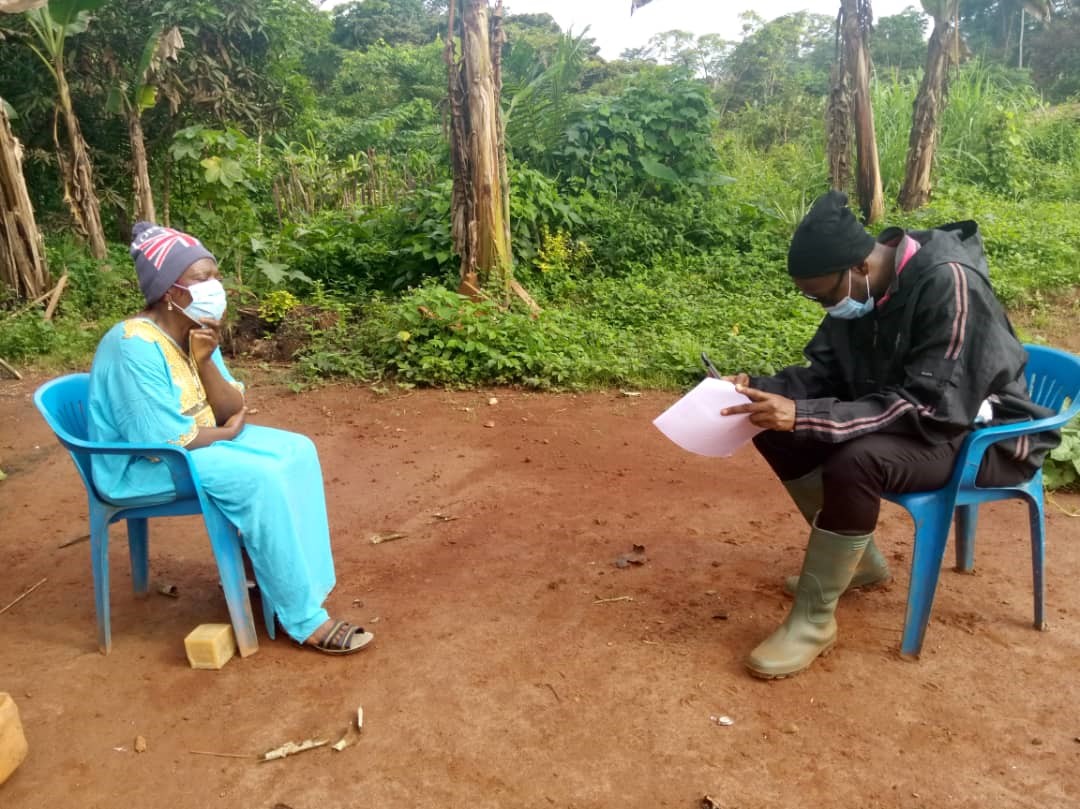University of Oxford
11a Mansfield Rd
OX1 3SZ
UK

Cedric Thibaut Kamogne Tagne
Background
During my career mainly directed towards the sustainable management of wildlife, particularly in sub-Saharan Africa, I realized how crucial it was to take into account social considerations in conservation efforts, i.e. understanding and integrating the socio-environmental contexts and the different dynamics existing between populations and their environment in the decision-making.
It is therefore on the basis of this conviction that I attach great importance to the ICCS whose work is of particular interest to me, and also that I felt the need to set up my own NGO called CASE (Collective Action to Save our Environment), whose vision is to integrate citizens, regardless of their profile, into conservation and environmental preservation efforts.
Research Interests

My main research interest is conservation (social), with work contributing to the sustainable use of wildmeat, i.e. the trade, hunting and consumption of wild meat.
Indeed, for as long as I can remember I have always been a lover of wildlife and the desire to protect them has never ceased to grow in me, all the more so today that I understand their ecological niches and their importance in even larger ecosystem dynamics.
However, while in the past many conservation initiatives have been implemented without adequate consideration of the populations who depend on these resources, it is now recognized as more than necessary to involve these populations in the heart of conservation initiatives. Not only does this guarantee a better integration of the initiatives in their intervention environment with subsequent better results, but also because it benefits to a more just and equitable decision-making for human populations. Moreover, adequate strategies can produce tangible benefits in terms of development at a local, regional or even national level.
Consequently, my work aims to contribute to the sustainability of species as well as to the improvement of human living conditions, these two objectives being in my opinion inextricably linked.
Current Research
I am currently employed at CIFOR under the WILDMEAT Handling project and the Wildmeat interventions project:
1- WILDMEAT Handling project:
Wild animals used for food are major reservoirs for many pathogens. Many zoonotic diseases pose risks of epidemics and pandemics. Despite the risks associated with wildlife use, there are practical ways of reducing the risk of contagion at different points in the wild meat food chain. This project aims to understand the behaviours that may expose actors to different risks along the wild meat food chain from the forest to the fork. The intended outcome of this project is to recommend activities and policies that can reduce the risks of disease transmission along the food chain. My work in this project include: collecting and formatting qualitative and quantitative data on wild meat handling in three sites in Cameroon, and the meta-analysis of data collected; producing a draft paper on wildmeat handling in Cameroon and lessons learned from data analysis.
2- Wildmeat interventions project
Many wild meat interventions have been implemented in Central Africa, without the details of these projects being published or their results being analysed. The CIFOR WILDMEAT project aims to create a database of wild meat interventions across Central Africa, to expand our knowledge on past and current wild meat interventions and their impacts, and to provide a low-cost tool for project managers to evaluate project impacts. The specific part of this project that I work on are: collecting and formatting data relating to current and past wildmeat interventions in Cameroon, and the meta-analysis of data collected; the design of rapid and low-cost methodologies for evaluating wild meat intervention success; the conduct of a fieldwork to test the tool on 3 or 4 case-study in Cameroon; the production of a draft first author paper.
Brief CV
Summary
Results-oriented researcher for over four years with two years of experience as a research coordinator. Skilled at communicating with stakeholder groups and developing data collection strategies. Physical strength and character to work in very remote areas and under other difficult conditions.
Education
- December 2016: MASTER 2 in Environmental and Social Impact Assessment-HIES (Higher Institute of Environmental Sciences); THESIS TITLE: “socio-economic impacts of the fight against bushmeat trafficking in the forest zone of Cameroon”
Additional relevant training
- August 2021: Complaints Mechanism for the protection of Human Rights-RACOPY (Réseau Recherche Actions Concertées Pygmées);
- March 2020: Forest Investigation-EIA (Environmental Investigation Agency);
- December 2014: Training in Remote Detection and Follow up of forests-CIFOR (Center for International Forestry Research).
Employment
- October 2021-Nowaday: Researcher, CIFOR (Center for International Forestry Research)
- April 2019-August 2021: Research coordinator, FCTV (Fondation Camerounaise Terre Vivante)
- March 2017-December 2018: Research assistant, University of Oxford and the Zoological Society of London (ZSL)
Papers
- Kamogne Tagne, C. T., Brittain, S., Booker, F., Challender, D., Maddison, N., Milner-Gulland, E. J., Mouamfon, M., Roe, D., & Coad, L. (2022). Impacts of the COVID-19 pandemic on livelihoods and wild meat use in communities surrounding the Dja Faunal Reserve, South-East Cameroon. African Journal of Ecology, 60, 135– 145. https://doi.org/10.1111/aje.12995
- Brittain, S., Kamogne Tagne, C. T., Roe, D., Booker, F., Mouamfon, M., Maddison, N., Ngomna Tsabong, S. D., Mfone Nteroupe, S., & Milner-Gulland, E. J. (2022). The drivers of wild meat consumption in rural Cameroon: Insights for wild meat alternative project design. Conservation Science and Practice, e12700. https://doi.org/10.1111/csp2.12700
- Brittain, S., Kamogne Tagne, C. T., Booker, F., Maddison, N., Mfone Nteroupe, S., Mouamfon, M., Ngomna Tsabong, S. D., Roe, D., Wilson-Holt, O., & Milner-Gulland, E. (2022). Using scenarios-based interviews to predict changes in wild meat hunting and consumption in response to different alternatives projects. Conservation Science and Practice, 4(9), e12777. https://doi.org/10.1111/csp2.12777
- Brittain, S., Rowcliffe, M., Kentatchime, F. et al. (2022). Comparing interview methods with camera trap data to inform occupancy models of hunted mammals in forest habitats. Conservation Science and Practice, e12637. https://doi.org/10.1111/csp2.12637
- Tudge, S., Brittain, S., Kamogne-Tagne, C.T. et al. (2022). The impacts of human activity on mammals in a community forest near the Dja Biosphere Reserve in Cameroon. Oryx, pp 1-9, https://doi.org/10.1017/S0030605321000806
- Brittain, S., Rowcliffe, M., Earle, S., Kentatchime, F., Kamogne Tagne, C.T., & Milner-Gulland, E. J. (2022). Power to the people: Analysis of occupancy models informed by local knowledge. Conservation Science and Practice, e12753. https://doi.org/10.1111/csp2.12753
- Booth, H., Clark, M., Milner-Gulland, EJ et al. (2021) Investigating the risks of removing wild meat from global food systems. Current Biology, 31:8, pp1788-1797, https://doi.org/10.1016/j.cub.2021.01.079
- Brittain S, Booker F, Kamogne Tagne C T, Maddison N, Milner-Gulland E J, Mouamfon M and Roe D (2021) Wild meat alternative projects: practical guidance for project design. Version 2. IIED, London. https://pubs.iied.org/17661iied
Non-academic writing
- How is COVID-19 affecting wild meat consumption in rural Cameroon? Blog for the International Institute of Environment and Development, November 2020. https://www.iied.org/how-covid-19-affecting-wild-meat-consumption-rural-cameroon
Links
https://interventions.wildmeat.org/
https://www.iied.org/why-eat-wild-meat
